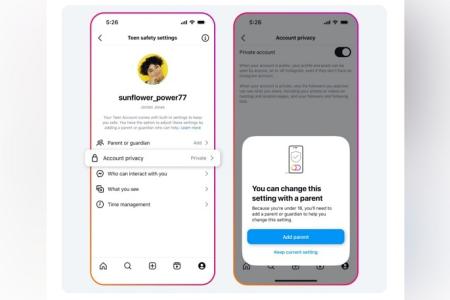Instagram to restrict features for S'pore users suspected to be underage
From Jan 21, Instagram accounts belonging to users under 18 years old in Singapore will have more restrictive settings by default as the app faces growing pressure to protect children online.
Instagram users suspected to be underage will be prompted to confirm their age by providing photo identification or submitting a video selfie.
The move, part of a global clean up of accounts belonging to users who have lied about their age, was first rolled out in the United States and Britain in late 2024 in response to global pressure to safeguard young users from addiction, cyberbullying and harmful content. Meta’s CEO Mark Zuckerberg, in particular, has faced criticism as a wave of US state attorneys in 2023 accused Meta of hooking children on its apps without mitigating its risks.
Instagram’s Teen Account settings - such as being invisible to strangers and receiving messages only from people they follow - will kick in if users cannot prove their age.
Videos of people fighting, promoting cosmetic procedures, violent movie scenes and other sensitive content will also be kept off the feeds of teen accounts.
Ms Tara Hopkins, Meta’s Global Director of Public Policy for Instagram and Threads, said the update, which is being progressively pushed to users in Asia, will significantly change the experience on the app for millions of users worldwide.
The measures aim to assure parents that children online will have a safer experience and move away from relying on age declarations as the main way of telling a user’s age, Ms Hopkins said.
Instagram uses a real-time facial scanning technology developed by age verification tech company Yoti, which she said while not perfect, marks the best in class for the technology.
Meta can also check for other social media accounts linked to the user’s phone number or email, she said, declining to elaborate to avoid giving hints for those keen to game the system.
The company is also building technology to proactively scan for users who have misrepresented their age by analysing users’ profile picture and the demographic of their followers, among other indicators, she added.
For instance, users that claim to adults but a large number of followers in their teens could be flagged for age verification, she said, adding that the measure will likely be trialed in the US first before other countries.
The change by Instagram marks a shift from the long-standing practice of simply accepting users’ age declarations. Social media companies have led similar purgings before, such as TikTok, which in 2021, removed more than 7.2 million accounts suspected of being owned by underage users.
Ms Hopkins clarified that existing measures to police the platform for cyberbullying, violent or sexual content and other harmful material have not been affected by Meta’s decision to wind down content moderation efforts on its platforms, which include Instagram, Facebook and Threads. The policy u-turn has been criticised as an effort to appease the far right.
Parents of young Instagram users can pair their account with their child’s to manually tweak the restrictions to gradually expose their children to new features on the app under parental supervision.
Users under 16 who try to change their account privacy settings will be prompted to add a parent to their account for approval. A new feature allows teens between age 16 and 18 to opt out of the restrictions, following feedback from parents that older teens should get more autonomy over their use of the app, said Ms Hopkins.
Teenagers who edit their age in their profile setting can be asked to verify their age by submitting ID or to screen their age.
Parents who want greater oversight over their child’s online activities can also set up a teen supervision account with their child’s agreement.
The account will enable parents to monitor their child’s time spent on Instagram, set screen time limits by restricting app access during specific periods, and send reminders encouraging breaks from the app.
Parents can also view profile details of individuals their child has messaged and those the child has blocked on Instagram.
Addressing privacy concerns, Ms Hopkins said: “We think we have the right balance.”
Parents can see who their children are messaging but not the content, she said, adding: “The objective here is to give parents information to have an offline conversation with their teen.”
Get The New Paper on your phone with the free TNP app. Download from the Apple App Store or Google Play Store now


